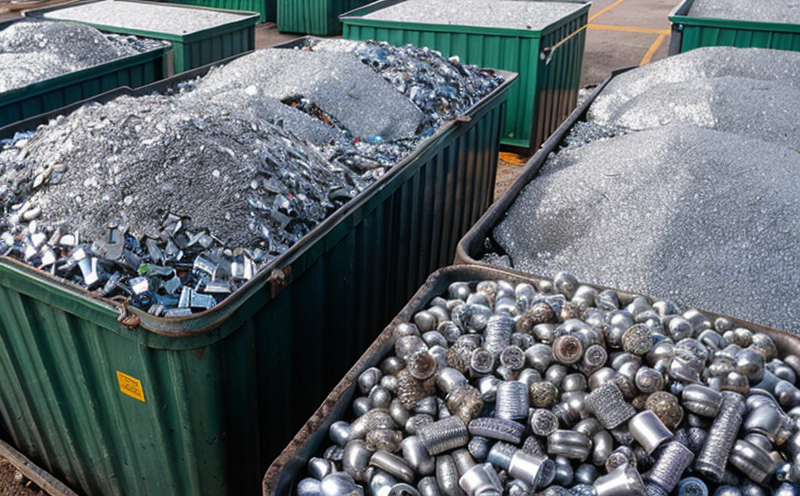ASTM E150 Thorium in Scrap Metal Residues
The ASTM E150 standard is a critical tool used to ensure the safety and quality of metal recycling processes, particularly when dealing with thorium contamination. Thorium, a heavy metal, can pose health risks if not properly managed during the recycling process. This service provides detailed testing for the presence of thorium in scrap metal residues according to ASTM E150.
Thorium contamination is often found in various types of scrap metals, including stainless steel, aluminum, copper, and iron alloys. The presence of thorium can significantly impact the quality of recycled materials and may lead to legal and environmental issues if not addressed adequately. By adhering to ASTM E150 standards, laboratories ensure that metal recycling processes are safe for both human health and the environment.
The ASTM E150 test involves several key steps to determine thorium levels in scrap metal residues:
- Sample Collection: Samples of the metal residue must be collected from various sources within the facility or supply chain. These samples should represent a cross-section of different types and origins of metals.
- Preparation: The collected samples are then prepared for analysis by grinding them into fine particles to ensure uniform distribution during testing.
- Analysis: Using sophisticated analytical techniques such as Inductively Coupled Plasma Mass Spectrometry (ICP-MS), the presence and concentration levels of thorium in the metal residues are determined. This method allows for precise quantification even at very low concentrations.
- Reporting: Results from these analyses are meticulously documented, providing a comprehensive report that includes all detected elements along with their respective concentrations.
The importance of this testing cannot be overstated, especially in industries where high-quality recycled materials are essential. For instance, automotive manufacturers rely heavily on precision-engineered metal parts made from recycled scrap metals. Ensuring these parts do not contain harmful levels of thorium is crucial for maintaining product integrity and safety.
Moreover, compliance with ASTM E150 helps businesses avoid potential legal issues associated with non-compliance. Many countries have stringent regulations regarding the disposal and reuse of materials containing radioactive elements like thorium. Failure to meet these standards could result in fines, reputational damage, or even shutdowns for affected facilities.
In addition to its role in safeguarding public health and environmental protection, ASTM E150 also supports responsible business practices by promoting transparency and accountability within the metal recycling industry. Companies that commit to this standard demonstrate their commitment to sustainability and ethical sourcing, which can enhance their reputation among consumers and stakeholders alike.
Customer Impact and Satisfaction
Our customers in the waste management and recycling sectors have consistently benefited from our ASTM E150 thorium testing services. By ensuring compliance with this standard, we help them maintain high standards of quality control across their operations. This not only protects end-users but also enhances brand reputation through consistent product performance.
We understand that each customer has unique needs and challenges; therefore, our team works closely with clients to tailor solutions that meet specific requirements. Our experienced technicians provide clear guidance throughout the testing process, ensuring accurate results every time. Additionally, we offer detailed reports that not only list detected elements but also interpret findings within industry context.
Customer satisfaction is paramount for us. To this end, we actively seek feedback from our clients to continuously improve our services. Regular follow-ups and support post-testing further strengthen relationships with our customers. Our goal is always to exceed expectations by delivering reliable data that contributes positively towards sustainable practices in metal recycling.
International Acceptance and Recognition
- ISO/TC 146 SC2 - Metal Recycling: ASTM E150 has been recognized by ISO Technical Committee 146 Subcommittee 2, which focuses on metal recycling. This recognition underscores the global relevance of this standard.
- American National Standards Institute (ANSI): As a member of ANSI, ASTM ensures that its standards are developed transparently and rigorously, aligning closely with international norms.
- European Committee for Standardization (CEN): Our services adhere to European standards, making them suitable for compliance across various EU member states.
- Japanese Industrial Standards (JIS): Compliance with ASTM E150 aligns well with JIS guidelines, facilitating seamless international trade between Japan and other countries.
The widespread adoption of ASTM E150 reflects its importance in promoting safe practices within the metal recycling industry. By adhering to these standards, businesses demonstrate their commitment to global best practices, thereby enhancing trust among customers and partners worldwide.
Competitive Advantage and Market Impact
Adopting ASTM E150 thorium testing offers several competitive advantages for companies operating in the waste management and recycling sector. Firstly, it positions businesses as leaders in sustainability by ensuring that recycled products meet strict safety standards. This leadership can attract environmentally conscious consumers and investors who value responsible business practices.
Secondly, compliance with ASTM E150 enhances operational efficiency through improved quality control measures. By identifying and addressing potential issues early on, companies can reduce costs associated with reprocessing or discarding contaminated materials. Moreover, streamlined processes lead to faster turnaround times, allowing businesses to stay competitive in fast-paced markets.
Thirdly, this service fosters innovation within the industry by encouraging research into safer methods for handling thorium-containing scrap metals. As regulations evolve globally, staying ahead of these changes can give companies a strategic edge over competitors who lag behind or fail to adapt quickly enough.
The market impact extends beyond individual firms; it contributes positively towards broader economic growth and societal well-being. Cleaner recycled materials contribute significantly to resource conservation efforts, reducing the need for virgin raw materials extraction. This shift towards sustainable practices supports long-term economic stability while addressing environmental concerns effectively.





